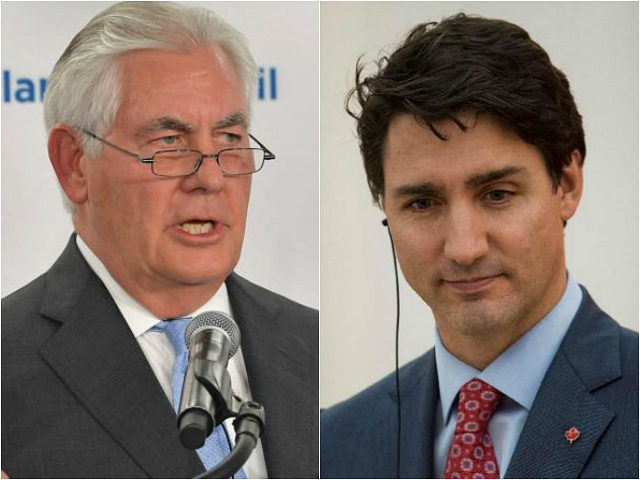Secretary of State Rex Tillerson will meet Canadian Prime Minister Justin Trudeau next week to discuss an upcoming multilateral meeting on the North Korean nuclear threat, according to Reuters.
The news agency cites an “Ottawa source” who says Tillerson will be visiting Canada on December 19 for a “day trip” to coordinate the upcoming dialogue, scheduled to occur in Vancouver next month. The source states he will meet both Trudeau and his counterpart, Canadian Foreign Minister Chrystia Freeland.
The meeting is not a surprise, as the left-wing Canadian government has touted its desire to play a more prominent role in finding a peaceful way to end North Korea’s consistent threats against the free world, and particularly the United States, for months. Canadian ambassador to China John McCallum floated the idea in September, stating in a television interview, “If there was anything we can do, either to help to set what would be on the table, or to persuade either of the two parties to come to the table, or to be a broker if negotiations begin, I am sure that we would be happy to do that.”
Canadian officials told the Toronto Star in November that they felt it necessary to find a diplomatic resolution to the crisis. “It’s been years since diplomatic conversations went dormant,” one unnamed diplomatic official told the newspaper. “This is part of an effort to involve all the players who should be involved … It helps give legs to a diplomatic solution.”
A month later, U.S. ambassador to China told reporters at a forum in that country that a Trudeau-Tillerson meeting would occur “in the next two weeks” and would directly deal with addressing communist North Korea. Trudeau was in China attempting to boost bilateral trade ties at the time.
The two countries have yet to publicly state which other nations they expect to be involved in the talks or how, specifically, such a dialogue could help stop the North Korean nuclear program. In November, Canadian outlets reported that as many as at least a dozen nations could be involved in the discussion. CBC cited a source at the time stating that the goal of both American and Canadian diplomats participating in organizing the talks would be to have all 16 nations that participating in the Korean War present at the table.
That list would include China, North Korea’s largest trading partner and ally. Beijing maintains essential economic ties with North Korea but has issued assurances to the U.S. government that it opposes nuclearization generally and a nuclear war on its border specifically. The Chinese solution to the North Korean crisis, however, would involve the United States withdrawing from Asia militarily and offering China an opportunity to fully control the region.
In remarks prior to his trip to China, Trudeau expanded the possibilities even further, suggesting that rogue states allied with the communist Kim Jong-un regime may also participate in these talks.
“I’ve had surprising conversations with places you wouldn’t expect, including places like Cuba, where they actually have … decent diplomatic relations with the North Korean regime,” Trudeau claimed. “And can we pass along messages through surprising conduits? There hasn’t been huge amount of discussion around that, but it was a topic of conversation when I met President Raul Castro last year.”
Trudeau visited Cuba in November 2016, shortly before the death of dictator and Trudeau family friend Fidel Castro. Despite the island nation’s abysmal human rights record, Trudeau has endeavored to assure the Castro regime that Canada’s relations with Cuba will not sour despite American President Donald Trump reasserting the United States’ commitment to opposition to tyrannical regimes following the failed Obama-era “normalization” of relations with the regime.
The Canadian Prime Minister did not reveal at the time, however, that he had discussed diplomacy with North Korea while in Havana. That recent revelation raises concerns regarding what role Cuba, a stalwart ally of the Kim regime, will play in ending the North Korea nuclear program given evidence indicating that Cuba profits from Kim’s significant investment in national defense.
While President Trump has approached North Korea firmly, repeatedly reminding Kim that Washington will not allow a nuclear catastrophe to occur at his hands, Trudeau’s more diplomatic approach, favored by prior U.S. Democratic presidents, also remains popular at the United Nations. This week, the U.N. sent its political affairs chief Jeffrey Feltman to North Korea to seek insights on what would convince the Kim regime to abandon its nuclear weapons program.
North Korea, meanwhile, opened a “defense conference” on Tuesday which, according to South Korea’s Yonhap news agency, features louder calls for a “heyday” of military development, including nuclear power.

COMMENTS
Please let us know if you're having issues with commenting.